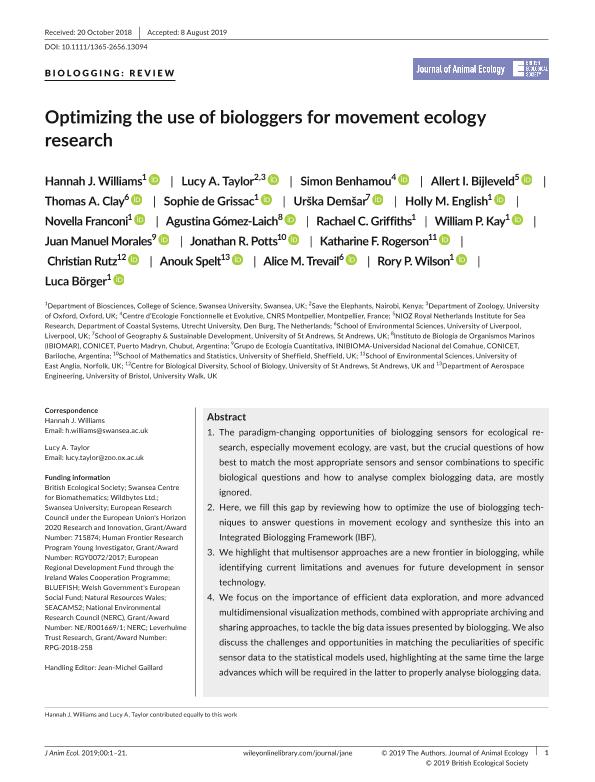Artículo
Optimizing the use of biologgers for movement ecology research
Williams, Hannah J.; Taylor, Lucy; Benhamou, Simon; Bijleveld, Allert; Clay, Thomas; de Grissac, Sophie; Demsar, Urska; English, Holly M.; Franconi, Novella; Gómez Laich, Agustina Marta ; Griffiths, Rachael; Kay, William P.; Morales, Juan Manuel
; Griffiths, Rachael; Kay, William P.; Morales, Juan Manuel ; Potts, Jonathan; Rogerson, Katharine F.; Rutz, Christian; Spelt, Anouk; Trevail, Alice; Wilson, Rory P.; Börger, Luca
; Potts, Jonathan; Rogerson, Katharine F.; Rutz, Christian; Spelt, Anouk; Trevail, Alice; Wilson, Rory P.; Börger, Luca
 ; Griffiths, Rachael; Kay, William P.; Morales, Juan Manuel
; Griffiths, Rachael; Kay, William P.; Morales, Juan Manuel ; Potts, Jonathan; Rogerson, Katharine F.; Rutz, Christian; Spelt, Anouk; Trevail, Alice; Wilson, Rory P.; Börger, Luca
; Potts, Jonathan; Rogerson, Katharine F.; Rutz, Christian; Spelt, Anouk; Trevail, Alice; Wilson, Rory P.; Börger, Luca
Fecha de publicación:
01/2020
Editorial:
Wiley Blackwell Publishing, Inc
Revista:
Journal Of Animal Ecology
ISSN:
0021-8790
e-ISSN:
1365-2656
Idioma:
Inglés
Tipo de recurso:
Artículo publicado
Clasificación temática:
Resumen
The paradigm-changing opportunities of biologging sensors for ecological research, especially movement ecology, are vast, but the crucial questions of how best to match the most appropriate sensors and sensor combinations to specific biological questions and how to analyse complex biologging data, are mostly ignored. Here, we fill this gap by reviewing how to optimize the use of biologging techniques to answer questions in movement ecology and synthesize this into an Integrated Biologging Framework (IBF). We highlight that multisensor approaches are a new frontier in biologging, while identifying current limitations and avenues for future development in sensor technology. We focus on the importance of efficient data exploration, and more advanced multidimensional visualization methods, combined with appropriate archiving and sharing approaches, to tackle the big data issues presented by biologging. We also discuss the challenges and opportunities in matching the peculiarities of specific sensor data to the statistical models used, highlighting at the same time the large advances which will be required in the latter to properly analyse biologging data. Taking advantage of the biologging revolution will require a large improvement in the theoretical and mathematical foundations of movement ecology, to include the rich set of high-frequency multivariate data, which greatly expand the fundamentally limited and coarse data that could be collected using location-only technology such as GPS. Equally important will be the establishment of multidisciplinary collaborations to catalyse the opportunities offered by current and future biologging technology. If this is achieved, clear potential exists for developing a vastly improved mechanistic understanding of animal movements and their roles in ecological processes and for building realistic predictive models.
Archivos asociados
Licencia
Identificadores
Colecciones
Articulos(INIBIOMA)
Articulos de INST. DE INVEST.EN BIODIVERSIDAD Y MEDIOAMBIENTE
Articulos de INST. DE INVEST.EN BIODIVERSIDAD Y MEDIOAMBIENTE
Citación
Williams, Hannah J.; Taylor, Lucy; Benhamou, Simon; Bijleveld, Allert; Clay, Thomas; et al.; Optimizing the use of biologgers for movement ecology research; Wiley Blackwell Publishing, Inc; Journal Of Animal Ecology; 89; 1; 1-2020; 1-21
Compartir
Altmétricas



